一般现在时和一般将来时
一般现在时、现在进行时、一般将来时、一般过去时知识点总结
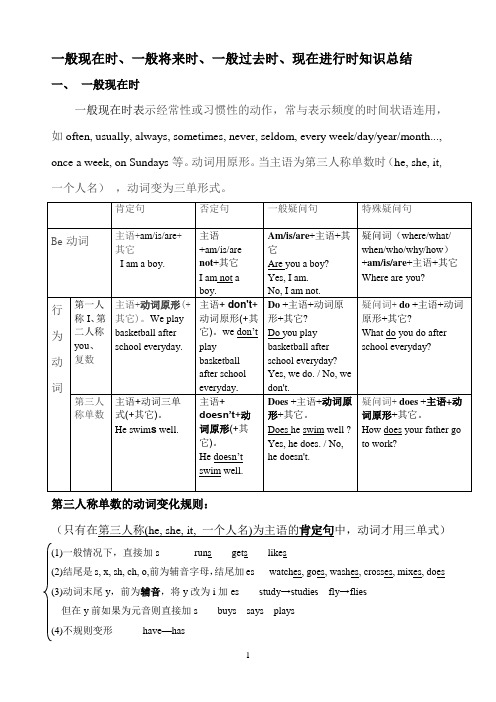
一般现在时、一般将来时、一般过去时、现在进行时知识总结一、一般现在时一般现在时表示经常性或习惯性的动作,常与表示频度的时间状语连用,如often, usually, always, sometimes, never, seldom, every week/day/year/month..., once a week, on Sundays等。
动词用原形。
当主语为第三人称单数时(he, she, it, 一个人名),动词变为三单形式。
第三人称单数的动词变化规则:(只有在第三人称(he, she, it, 一个人名)为主语的肯定句中,动词才用三单式)(1)一般情况下,直接加s runs gets likes(2)结尾是s, x, sh, ch, o,前为辅音字母,结尾加es watches, goes, washes, crosses, mixes, does(3)动词末尾y,前为辅音,将y改为i加es study→studies fly→flies但在y前如果为元音则直接加s buys says plays(4)不规则变形have—has二、一般将来时一般将来时表示将来发生的事。
常与tomorrow, next day/week/month/year..., soon, in a few minutes, the day after tomorrow, in the future等时间状语连用。
Will/shall +动词原形;(shall用语第一人称)be(am/is/are) going to+ 动词原形三、一般过去时一般过去时表示过去某一时候或某一段时间所发生了的事情或存在的状态。
常与过去时间yesterday,ago, this morning,just now,a moment ago,last night / year / week/month,once upon a time,the other day,before,the day before yesterday, in 1989, at the age of five, one day, then(那时), on that day,in the past连用。
表示将来的时态(一般现在时表将来,现进表将来以及一般将来时)

我相信,中国将会变成世界上最富有的国家之一。
There is going to be a heavy rain.
将会பைடு நூலகம்一场大雨。
②be going to和will均可表示“意图”:事先考虑过的意图用be going to;不是 事先考虑的意图即临时决定的用will。 I’m going to Qingdao this weekend. 这个周末我要去青岛。 —Sorry,I forgot to buy the book you need. ——对不起,我忘了去买你要的书了。 —It doesn’t matter. I will go myself. ——没关系。我自己去买就行了。
一般现在时
在时间和条件状语从句中可用一般现在时代替
一般将来时。 I’ll let you know as soon as I hear from him. 我一接到他的信就告诉你。
现在进行时
有些动词,如come, go, leave, return, arrive,
begin, start等,它们的现在进行时可表示不远 的将来要发生的事情。例如: Flight 1095 is landing soon. 第1095号航班马上要着陆了。
(
(
)5. Look! Some visitors __ for the bus over there. (2015南宁) A. are waiting B. is waiting C. waiting D. Wait
( (
) 6. ---What were you doing at 5:30 yesterday afternoon? --- I ______ with Sam.(2016 钦州) A. walk B. walks C. was walking D. walked )7. — What are you going to do tomorrow?(2014 柳州) — I ______ visit my aunt. A. went to B .go to C. am going to
一般现在时与一般将来时的区别
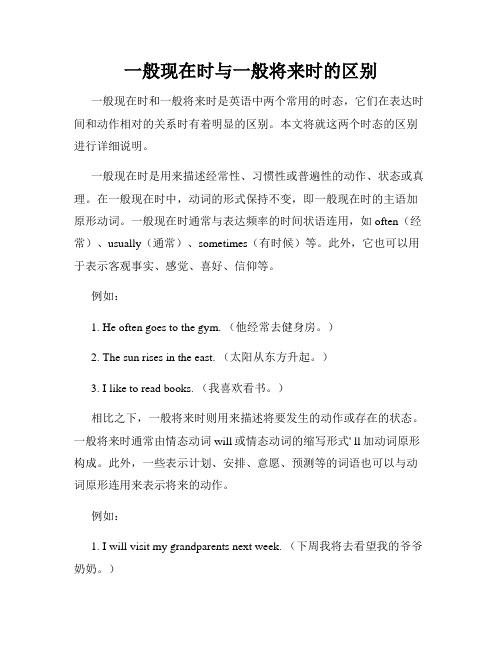
一般现在时与一般将来时的区别一般现在时和一般将来时是英语中两个常用的时态,它们在表达时间和动作相对的关系时有着明显的区别。
本文将就这两个时态的区别进行详细说明。
一般现在时是用来描述经常性、习惯性或普遍性的动作、状态或真理。
在一般现在时中,动词的形式保持不变,即一般现在时的主语加原形动词。
一般现在时通常与表达频率的时间状语连用,如often(经常)、usually(通常)、sometimes(有时候)等。
此外,它也可以用于表示客观事实、感觉、喜好、信仰等。
例如:1. He often goes to the gym. (他经常去健身房。
)2. The sun rises in the east. (太阳从东方升起。
)3. I like to read books. (我喜欢看书。
)相比之下,一般将来时则用来描述将要发生的动作或存在的状态。
一般将来时通常由情态动词will或情态动词的缩写形式' ll加动词原形构成。
此外,一些表示计划、安排、意愿、预测等的词语也可以与动词原形连用来表示将来的动作。
例如:1. I will visit my grandparents next week. (下周我将去看望我的爷爷奶奶。
)2. She is studying hard because she'll have an important exam tomorrow. (她正在努力学习,因为明天她将有一场重要的考试。
)3. Tomorrow, we are going to have a picnic in the park. (明天,我们计划去公园野餐。
)在一般现在时和一般将来时中,动词的形式是不同的,且它们分别在时间和动作的表达上有着不同的目的和功能。
一般现在时强调现在的行为、状态或普遍性的事实,而一般将来时则表示将来的动作或存在的状态。
总结起来,一般现在时和一般将来时的区别主要体现在以下几个方面:动词形式不同,时间概念不同,以及表达的目的和功能不同。
一般现在时-现在进行时-一般将来时

1一般现在时( Present Simple)2。
现在进行时(Present Continuous)3. 将来的安排和打算( Future Arrangements and Intentions)一、一般现在时、现在进行时(一)、辨”个性”一般现在时表示经常性或习惯性的动作,以及主语的特征或状态。
1。
表示主语现在的状态或特征。
例如:I am a teacher.We have a very good relationship with our parents.2。
表示经常性或习惯性动作。
例如:My father goes to work by bike every day。
I always leave home for school at 6:303 。
表示自然现象,普遍真理,客观存在或科学事实。
例如:Shanghai lies in the east of China.The earth moves around the sun.现在进行时表示现在或现阶段正在进行的动作。
例如:1。
表示现在(指说话人说话时)正在发生的事情We are waiting for you at the moment。
2. 表示现阶段正在进行或发生的动作President Xi is visiting in the USA these days。
(二)、辨结构一般现在时的结构是:主 + 动词原形或动词的第三人称单数形式 +...。
.。
现在进行时的结构是: 主 + be(are/ is/am),动词的—ing形式+.。
...。
(三)、辨”信息词"一般现在时常和以下这些时间状语连用:always, often, usually=normally, sometimes=at times, regularly, seldom, never, hardly ever, from time to time, once a month, every day, on Sundays。
一般现在时-一般过去式-一般将来时
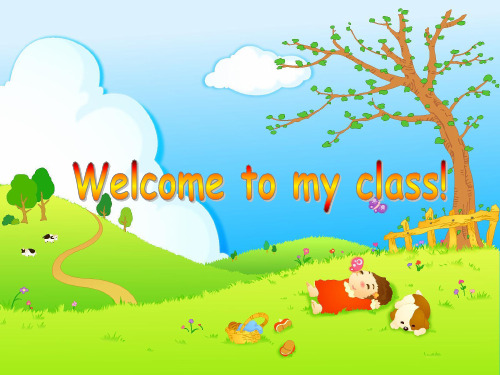
一般现在时: always , usually, often, sometimes ,seldom, never, every day, every… ,three times a day
last night, last…, two days ago, …ago, 一般过去时: in 1999, in +过去的年份,
__H__o_w_ __l_o_n_g_ ___d_i_dshe ___st_a_ythere? 4、There was some orange in the cup.〔变一般疑问句)
__W__a_sthere __a_n_y_ orange in the cup?
现在进展时: Present Progressive
一般现在时:Present Simple
表示常常或者反复发生的动作
信息词:
often〔常常〕
sometimes〔有时〕
always〔总是〕 usually〔通常〕
every day〔每天〕 every week〔每周〕
every month〔每月〕 every term〔每学期〕
every year〔每年〕
常用时 间
常与一般过去时态连用的时间有:
yesterday
yesterday morning (afternoon, evening…)
last night (week, month, year…)
two days ago, a week ago, three years ago…
in 1990, (in 1998…)
但当主语是第三人称单数时,谓语动词形式有变化,一般在动词 末尾加s,否认句在行为动词前加doesn’t, 一般疑问句在句前加 does
五种时态一般现在时的_一般过去式_现在进行_现在完成时_一般将来时
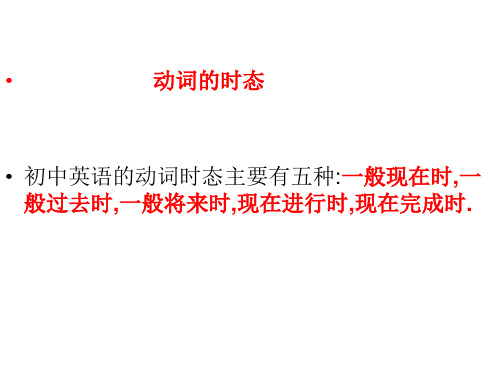
• • • • • • • • • • • • • • • • • • • • • • • • • • •
( ) 19. The day after tomorrow they ________ a volleyball match. A. will watching B. watches C. is watching D. is going to watch ( ) 20. There ________ a birthday party this Sunday. A. shall be B. will be C. shall going to be D. will going to be ( ) 21. They ________ an English evening next Sunday. A. are having B. are going to have C. will having D. is going to have ( ) 22. ________ you ________ free next Sunday? A. Will; are B. Will; be C. Do; be D. Are; be ( ) 23. He ________ there at ten tomorrow morning. A. will B. is C. will be D. be ( ) 24. ________ your brother ________ a magazine from the library? A. Are; going to borrow B. Is; going to borrow C. Will; borrows D. Are; going to borrows ( ) 25. – Shall I come again tomorrow afternoon? –________ (好的). A. Yes, please B. Yes, you will. C. No, please. D. No, you won’t. ( ) 26. It ________ the year of the horse next year. A. is going to be B. is going to C. will be D. will is ( ) 27. ________ open the window? A. Will you please B. Please will you C. You please D. Do you
一般现在时、一般过去时、一般将来时、现在进行时句子结构

题目一般过去时,现在进行时,一般将来时,一般现在时的句子结构答案解析一、一般现在时结构:主语+ 谓语动词(实义动词或者是be动词)+ 宾语当主语是第三人称单数的时候,后面的谓语动词一定要变成动词的第三人称单数形式. 例:He has an English book.句子中的have 是动词原形,has则是have的第三人称单数形式二、现在进行时结构:be + v+ing + sthbe动词包括(am is are) 什么情况用哪个be动词是由主语决定的!当主语是第一人称“I ”的时候be 动词一定只可以用am当主语是单三的时候,be 动词要用is当主语是第二人称you 或者是其他的时候,be动词一定要用arev+ing 表示的是现在分词,也就是动词的ing 形式现在分词的变化形式:1.动词是以字母“e ”结尾的要去掉e 再+ ing2.直接在动词词尾+ing3.词尾是以一个元音字母加上一个辅音字母,且重读闭音节结尾的要双写辅音字母再+ing 例:play- playing take - takingdo - doing leave - leavingput - putting cut - cutting例:I am playing football with my classmates.He is watching TV at home.They are having an English class.三、一般将来时1.结构:be + going to +do sth例:I am going to do my homework tomorrow.He is going to babysit his sister.We are going to go shopping this weekend.2.will + v(原形)例:He will come back later.I will visit my grandparents next week.3.be + doing sth现在进行时也可以表示计划、打算要做的事情例:I am leaving for Shanghai next Sunday.四、一般过去时结构:主语+ 动词过去式(be 动词,或者实义动词) + 宾语例:I was a little girl 10 years ago.He went to the Great Wall last month.I visited my cousins last Saturday.。
一般现在时和一般将来时

一般现在时:
一般现在时(Simple present)。
表示通常性、规律性、习惯性的状态或者动作有时间规律发生的事件的一种时间状态。
经常性:“经常发生的动作”,比如每天起床、吃饭、上学,一个星期去几次超市或新华书店等。
规律性:在生活中,有的事情是有规律的,有的是偶尔做几次。
这些都算经常发生的事件。
习惯性:这个动作经常发生,是一般的情况而不是具体的某一次。
结构
一般将来时:
一般将来时表示将来某一时刻的动作或状态,或将来某一段时间内经常的动作或状态。
常常和表示将来的时间状语连用。
如:tomorrow(明天),next week(下周);in the future(将来)等。
句型:
①肯定句:主语+ be going to do /主语+will+ 动词原形
②否定句:主语+ be not going to do /主语+ will not+ 动词原形
③疑问句:Be动词+主语+ going to do /Will+主语+ 动词原形
例句:
We are going to go on an outing this weekend.
变为一般疑问句:
Are you going to go on an outing this weekend?
wiil的例句:
He will get married. 他就快结婚了。
英语语法一般现在时和一般将来时

1.一般现在时的用法1)经常性或习惯性的动作,常与表示频腮度的时间状语连用。
时间状语:every…, sometimes, at…, on Sunday。
例如:I leave home for school at 7 every morning. 每天早上我七点离开家。
2)客观真理,客观存在,科学事实。
例如:The earth moves around the sun. 地球绕太阳转动。
Shanghai lies in the east of China. 上海位于中国东部。
3)表示格言或警句。
例如:Pride goes before a fall. 骄者必败。
注意:此用法如果出现在宾语从句中,即使主句是过去时,从句谓语也要用一般现在时。
例:Columbus proved that the earth is round. 哥伦布证实了地球是圆的。
4)现在时刻的状态、能力、性格、个性。
例如:I don't want so much. 我不要那么多。
Ann writes good English but does not speak well. 安英语写得不错,讲的可不行。
比较:Now I put the sugar in the cup. 把糖放入杯子。
I am doing my homework now. 我正在做功课。
第一句用一般现在时,用于操作演示或指导说明的示范性动作,表示言行的瞬间动作。
第二句中的now是进行时的标志,表示正在进行的动作的客观状况,所以后句用一般现在时。
2. 一般过去时的用法1)在确定的过去时间里所发生的动作或存在的状态。
例如:时间状语有:yesterday, last week, an hour ago, the other day, in 1982等。
例如:Where did you go just now? 刚才你上哪儿去了?2)表示在过去一段时间内,经常性或习惯性的动作。
一般现在时和一般将来时的区别

一般现在时:1)表示经常的或习惯性的动作,常与表示频度的副词连用。
常用的频度副词有:always、often、usually、hardly ever、seldom、never。
频度副词在句中通常放在行为动词之前,系动词、助动词之后。
还有频度副词组,如:once a week, twice a month, three times a day, every day/…2)表示现在的状态。
例如:My father is at work. He is very busy. 我父亲在工作,他很忙。
The boy is twelve. 这男孩十二岁。
3)表示主语具备的性格、特征和能力等。
例如:Alan likes playing football.4)表示客观真理,客观存在,自然现象例如:The earth moves around the sun. 地球绕太阳转动。
一般将来时:概念:表示将要发生的动作或存在的状态及打算、计划或准备做某事。
时间状语:tomorrow,next day(week,month,year....),the day after tomorrow,soon,in+一段时间(a few minutes,three day),by...,etc.基本结构:①am/is/are/going to +do;②will/shall+do③is/am/are + doing*shall适用于I和we, will适用于任何人称【其他结构】be + 不定式;be about to do否定形式:①am/is/are +not+going to +do;②will/shall+not+do③is/am/are + doing一般疑问句:①be放于句首;②will/shall提到句首。
初中英语语法:一般现在时、一般过去时和一般将来时
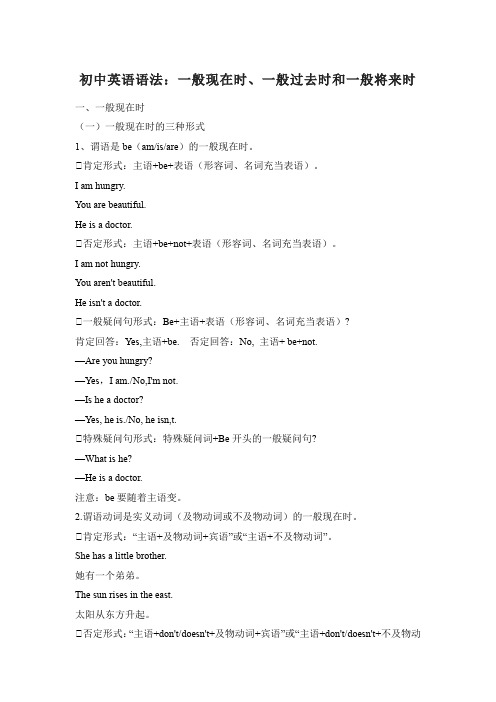
初中英语语法:一般现在时、一般过去时和一般将来时一、一般现在时(一)一般现在时的三种形式1、谓语是be(am/is/are)的一般现在时。
①肯定形式:主语+be+表语(形容词、名词充当表语)。
I am hungry.You are beautiful.He is a doctor.①否定形式:主语+be+not+表语(形容词、名词充当表语)。
I am not hungry.You aren't beautiful.He isn't a doctor.①一般疑问句形式:Be+主语+表语(形容词、名词充当表语)?肯定回答:Yes,主语+be. 否定回答:No, 主语+ be+not.—Are you hungry?—Yes,I am./No,I'm not.—Is he a doctor?—Yes, he is./No, he isn,t.①特殊疑问句形式:特殊疑问词+Be开头的一般疑问句?—What is he?—He is a doctor.注意:be要随着主语变。
2.谓语动词是实义动词(及物动词或不及物动词)的一般现在时。
①肯定形式:“主语+及物动词+宾语”或“主语+不及物动词”。
She has a little brother.她有一个弟弟。
The sun rises in the east.太阳从东方升起。
①否定形式:“主语+don't/doesn't+及物动词+宾语”或“主语+don't/doesn't+不及物动词”。
She doesn't have a little brother.她没有弟弟。
I don't eat every morning.我每天早晨都不吃饭。
①一般疑问句形式:“Do/Does+主语+及物动词原形+宾语”或“Do/Does+主语+不及物动词原形”。
肯定回答:Yes,主语+do/does. 否定回答是:No, 主语+ don't/doesn't.—Do you eat every morning?—Yes, I do./No, I don't.—Does she have a little brother?—Yes, she does./No, she doesn't.①特殊疑问句:特殊疑问词+do/does开头的一般疑问句?What do you like?When do you go to school?注意:根据主语确定用do还是does。
一般现在时、一般过去时、一般将来时 讲义和练习

一般现在时、一般过去时、一般将来时讲义和练习一、一般现在时1.概念:经常、反复发生的动作或行为,现在的某种状况,表示普遍真理或客观事实2.时间状语: Always, usually, often, sometimes, every week (day, year, month…), once a week(day, year, month…), on Sundays,3.基本结构:主语 + 动词原形+其他(如主语为第三人称单数,动词上要改为第三人称单数形式)4.否定形式:主语+am/is/are +not+其他; 此时态的谓语动词若为行为动词,则在其前加don't, 如主语为第三人称单数,则用doesn't,同时还原行为动词。
5.一般疑问句:把be动词放于句首;用助动词do提问,如主语为第三人称单数,则用does,同时,还原行为动词。
二、一般过去时1.概念:过去某个时间里发生的动作或状态;过去习惯性、经常性的动作、行为。
2.时间状语:ago, yesterday, the day before yesterday, last week,last(year, night, month…), in 1989, just now, at the age of 5, one day, long long ago, once upon a time, etc.3.基本结构:主语+be动词过去式;主语+行为动词的过去式4.否定形式:主语+was/were +not+其他;在行为动词前加didn't,同时还原行为动词。
5.一般疑问句:was或were放于句首;用助动词do的过去式did 提问,同时还原行为动词。
6.例句:She often came to help us in those days.I didn't know you were so busy.三、现在进行时1.概念:表示现阶段或说话时正在进行的动作及行为。
一般现在时、一般过去时、一般将来时、现在进行时
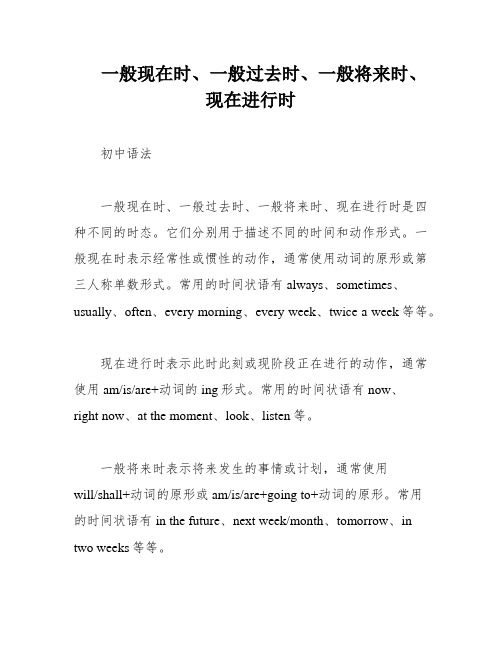
一般现在时、一般过去时、一般将来时、现在进行时初中语法一般现在时、一般过去时、一般将来时、现在进行时是四种不同的时态。
它们分别用于描述不同的时间和动作形式。
一般现在时表示经常性或惯性的动作,通常使用动词的原形或第三人称单数形式。
常用的时间状语有always、sometimes、usually、often、every morning、every week、twice a week等等。
现在进行时表示此时此刻或现阶段正在进行的动作,通常使用am/is/are+动词的ing形式。
常用的时间状语有now、right now、at the moment、look、listen等。
一般将来时表示将来发生的事情或计划,通常使用will/shall+动词的原形或am/is/are+going to+动词的原形。
常用的时间状语有in the future、next week/month、tomorrow、in two weeks等等。
一般过去时表示过去某一时刻或过去某一段时间所发生的动作,与现在无关。
动词的变化规则有以下几种:1)大多数动词在词尾加“S”;2)以辅音字母加“y”结尾的,要先将“y”变为“i”,然后在加“es”;3)以“s。
x。
ch。
sh”结尾的,在词尾加“es”;4)以“o”结尾的动词,加“es”。
现在进行时使用动词的ing形式,变化规则有以下几种:1)一般动词直接在词尾+ing;2)以不发音e结尾的动词,先去e再加ing;3)以重读闭音节结尾且末尾只有一个辅音字母的动词,双写末尾字母,再加ing。
3、一般过去时——动词的变化规则一般过去时是描述过去发生的事情,动词的变化规则如下:1)一般在动词后加-ed。
如:play-played。
offer-offered。
weigh-weighed。
destroy-destroyed。
sign-signed2)在以字母e结尾的动词后,只加-d。
如:like-liked。
一般现在时现在进行时一般将来时

一般现在时、现在进行时、一般将来时的区分一般现在时一、含义:表示事物(或人)的特征、状态,或表示经常性或习惯性的动作。
在一般现在时中,当主语是第三人称单数时,谓语动词要用第三人称单数形式,即常在动词原形后加-s或-es。
注:常见的词有:always、usually、often、sometimes等频率副词。
时间短语:every+时间/once a week/二、第三人称单数形式构成规则:1、大多数动词在词尾加“S”如:read-reads2、以辅音字母加“y”结尾的,要先将“y”变为“i”,然后在加“es”;以元音字母加“y”结尾的,直接加“S”如:fly-flies play-plays3、以“s, x, ch, sh”结尾的,在词尾加“es”如:watch-watches4、以“o”结尾的动词,加“es”,如:go-goes do-does5、以不发音字母“e”结尾的开音节词,加“s”如:make-makes watch-watches wash-washes6、特殊:○1be动词包括:am,is,are第三人称单数为is ○2have -has其他结构的变化形式:三、写出下列动词的第三人称单数形式:visit-- guess-- take-- go--rush-- feel-- cook-- wash- fly-- be--say-- run-- do-- worry-- live-- watch--enjoy-- have-- like-- play-- use-- teach-- buy-- study-- drink-- stay-- make-- plant-- trip-- carry-- come-- cry--四、用括号内动词的适当形式填空。
1. She often __________ (have)lunch at home.2. Sarah and Tom __________ (be) in Class One.3. We__________ (not watch) TV on Monday.4. Oliver __________ (not go) to school on Sunday.5.They __________ (like)playing football.6. What __________ they often__________ (do) on Saturdays?7. __________ your parents __________ (read) newspapers?8. The girl__________ (teach) us English on Sundays.9. She and I __________ (take) a walk together every evening.10. There __________ (be) some water in the bottle.11. Mike__________ (like) cooking.12. He__________ (have) two new books.13. My sister __________ (look) after her baby carefully.14. You always __________ (do) your homework well.15. I__________ (be) ill. I’m staying in bed.16. She __________ (go) to school from Monday to Friday.17. Liu Tao __________ (do) not like PE.18. The child often __________ (watch) TV in the evening.19. -What day __________(be) it today-It’s Saturday20.-How__________Dad __________(feel)-He __________(feel) not well.21.-Where__________ he __________(work)-He __________(work) at sea.现在进行时一、含义:表示正在做某事。
一般将来时和一般现在时的用法
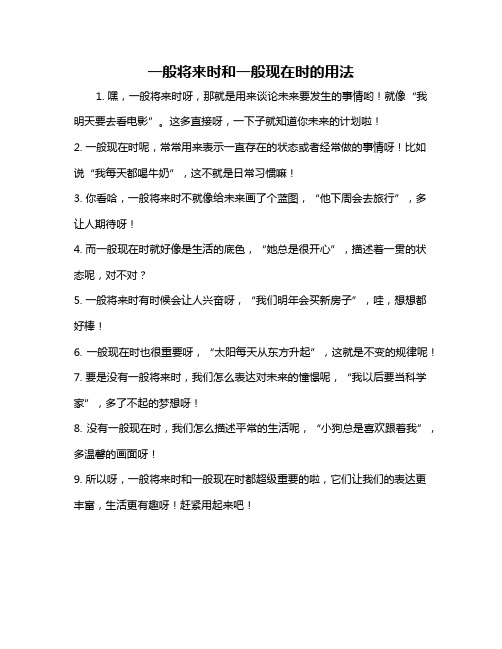
一般将来时和一般现在时的用法
1. 嘿,一般将来时呀,那就是用来谈论未来要发生的事情哟!就像“我明天要去看电影”。
这多直接呀,一下子就知道你未来的计划啦!
2. 一般现在时呢,常常用来表示一直存在的状态或者经常做的事情呀!比如说“我每天都喝牛奶”,这不就是日常习惯嘛!
3. 你看哈,一般将来时不就像给未来画了个蓝图,“他下周会去旅行”,多让人期待呀!
4. 而一般现在时就好像是生活的底色,“她总是很开心”,描述着一贯的状态呢,对不对?
5. 一般将来时有时候会让人兴奋呀,“我们明年会买新房子”,哇,想想都好棒!
6. 一般现在时也很重要呀,“太阳每天从东方升起”,这就是不变的规律呢!
7. 要是没有一般将来时,我们怎么表达对未来的憧憬呢,“我以后要当科学家”,多了不起的梦想呀!
8. 没有一般现在时,我们怎么描述平常的生活呢,“小狗总是喜欢跟着我”,多温馨的画面呀!
9. 所以呀,一般将来时和一般现在时都超级重要的啦,它们让我们的表达更丰富,生活更有趣呀!赶紧用起来吧!
我的观点结论:一般将来时和一般现在时在我们的语言表达中都不可或缺,它们各有各的作用,让我们能更好地与他人交流和展现自己的生活。
一般现在时、一般过去时、一般将来时

教学内容知识点一:一般现在时【知识梳理】(1)一般现在时的基本结构和变化1.一般现在时的结构①be动词:主语+be(am, is, are)+其它。
e.g. I am a boy.我是一个男孩。
②行为动词:主语+行为动词(+其它)。
一般现在时主要用动词的原形表示,如果主语是第三人称单数,则在动词原形后加"-s"或"-es"e.g. He gets up early in the morning.2.否定句和疑问句的变化①be动词的变化:A.否定句:主语+ be + not +其它。
He is not a worker.他不是工人。
B. 一般疑问句:Be +主语+其它。
---Are you a student? ---Yes. I am. / No, I'm not.C. 特殊疑问句:疑问词+一般疑问句。
Where is my bike?②行为动词的变化:A.否定句:主语+ don't( doesn't ) +动词原形(+其它)。
I don't like bread. / He doesn'tlike bread.B. 一般疑问句:Do ( Does ) +主语+动词原形+其它。
---Do you often play football? --- Yes, I do. / No, I don't.--- Does she go to work by bike? --- Yes, she does. / No, she doesn't.C. 特殊疑问句:疑问词+一般疑问句。
How does your father go to work?(注意回顾动词第三人称单数形式变化规则)一般情况下在词尾加s help→helps, clean→cleans, play→plays, wear→wears, give→gives; 以s, x, ch, sh结尾的动词在词尾加es dress→dresses, fix→fixes, watch→watches, finish→finishes;以“辅音字母加y”结尾的动词,把y变为i,再study→studies, carry→carries, fly→flies )(2)一般现在时的用法1.表示经常性或习惯性的动作或行为。
- 1、下载文档前请自行甄别文档内容的完整性,平台不提供额外的编辑、内容补充、找答案等附加服务。
- 2、"仅部分预览"的文档,不可在线预览部分如存在完整性等问题,可反馈申请退款(可完整预览的文档不适用该条件!)。
- 3、如文档侵犯您的权益,请联系客服反馈,我们会尽快为您处理(人工客服工作时间:9:00-18:30)。
They want good jobs.
The coat matches the dress.
This work does not satisfy me
Do you understand?
He always takes a walk after supper.
The sun rises in the east and sets in the west.
Sound travels faster through water than it does through air.
Time and tide wait for no man.
This cloth feels soft.
I love classical music.
The President still seems able to find time to go fishing
The meeting begins at 7:00
We leave at 8:00 sharp
When you come next time ,bring me some magazines
If time allows ,we shall go there tomorrow
Whether he agrees or not ,I will stay at home
China declares manned spaceflight successful
You mind your own business
If he does again ,he goes to prison
Here comes the bus
There goes the bell
His words fetches a laugh from all present
I did not sleep well last night
Did you direct the tourist to the hotel
He fell ill yesterday suddenly
He was already in the habit of reading widely in his boyhood
He used to study late into the night when he was in senior three
He would sit for hours doing nothing
He entered the room ,picked up a magazine and looked through it carefully
The students got up early in the morning ,did morning exercises and then read English aloud in the open air
She told me she would not go if it rained next day
It is time we went
I wish I were 20 years younger
I would rather you did not do anything for the time being
I wondered if you could give me a hand
Might I come and see you tonight。
